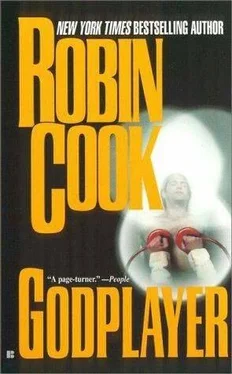“She doesn’t want to hurt the hospital,” said George. “Her main point is that she thinks peer review doesn’t work. People like Thomas are allowed to go on destroying themselves and their patients because their colleagues won’t take action.”
“I know. At least I contacted the Drug Enforcement Administration and suggested they force the medical licensing board to contact them whenever a physician dies. That way no one can abuse a dead physician’s license.”
“That’s a good idea,” said George. “Did they do it?”
Dr. Ballantine shrugged. “I don’t know. To tell you the truth, I never followed up on it.”
“You know,” said George, “the thing about Thomas that bothers me the most is that he seemed so normal. But he must have been taking a lot of pills. I wonder how it got out of hand. I take a Valium now and then myself.”
“So do I,” said Ballantine. “But not every day like Thomas apparently did.”
“No, not every day,” admitted George, shaking his head. “You know I never could understand why he wouldn’t face the fact the whole department was going full-time. Maybe the pills did blunt his sense of reality. After that late-night meeting with the trustees, he could have written his own ticket. The money men were wild to keep him happy. Even if they did want him to give up an independent practice.”
“As good a surgeon as Thomas was,” said Dr. Ballantine, “he had trouble seeing beyond his own nose. He was like the subject of all those jokes. You know, the doctor who plays God.”
George was silent for a minute, thinking they all made decisions affecting their patients’ lives. “What about that triple valve replacement you mentioned last week,” George said, following his train of thought. “What have you decided to do?”
Ballantine took a careful sip of his coffee: “I’m not even going to present the case. The woman’s got questionable kidneys; she’s over sixty; and she’s been on welfare for years. Some of Thomas’s objections to our teaching cases were valid, and I don’t even want the committee to know about her. If that goddamn philosopher hears about this woman, he’ll probably insist we operate.”
George nodded, ostensibly agreeing. But in his mind he recognized they all played God to a degree, and he knew that was Cassi’s real concern. He’d promised her that when he became chief, which he’d already been guaranteed, he’d let such decision-making rest with the committee, including the philosopher.
George broke off from Ballantine and passed through the crowded lounge into the locker room. Passing by the phone he realized he felt more and more uncomfortable concerning Ballantine’s decision about the triple valve case. Abruptly he picked up the phone, called the operator, and put in a page for Rodney Stoddard.
***














